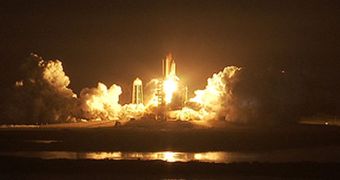After more than a month of delays caused by various technical difficulties, the Discovery space shuttle has been finally launched late on Sunday from the Kennedy Space Center's Launch Pad 39A, and is now heading for the International Space Station. NASA officials reported that the lift-off proceeded without a hitch, and that the leaking valves, which were the cause of so much concern, posed no threat at all, and acted within normal parameters. The launch sequence was completed at 7:43 pm EDT (2343 GMT), and the shuttle managed to successfully enter orbit.
Discovery is scheduled to dock on the ISS on Tuesday, where it will remain for the next 13 days. Mission planners have had to cut the original time line of the STS-119 flight by a day, due to delays in the original launch date. Over the next two weeks, the seven astronauts aboard the shuttle will assist colleagues on the International Space Station in installing the last array of American-built solar panels, which will complete the facility's electricity-generating capabilities.
The flight will also replace ISS crew member and NASA astronaut Sandra Magnus with Japanese expert Koichi Wakata, who will be his country's first representative in a long-duration mission. He will remain aboard the ISS for approximately 3 months, shorter than the standard length of a stage on the station. “Long-duration flight is almost like a permanent assignment to a foreign country. So I am very much looking forward to this. For me it is a new challenge to live and work in the space station,” Wakata told NASA in an interview, before the mission.
Also, three spacewalks will be performed during the 13-day interval, in which the panels will be attached and connected, and several new scientific experiments will be set up. Originally, four were put up, but the launch delays meant that one had to be removed from the program. Discovery has to clear the ISS within 13 days, as a Russian Soyuz mission is planned to deliver the ISS' Expedition 18 crew members in early April.

 14 DAY TRIAL //
14 DAY TRIAL //